- Home
- W. Somerset Maugham
Then and Now Page 13
Then and Now Read online
Page 13
He handed the drawings back to the secretary, and with a graciousness which Machiavelli noted acidly was no less regal than that of the King of France, dismissed him. Agapito da Amalia accompanied him out of the Duke's study. During the month he had been at Imola Machiavelli had taken pains to gain the Chief Secretary's confidence. He was related to the great Roman family of the Colonna, the bitter rivals of the Orsini, and so might be supposed to have a certain friendliness for the Florentines whose enemies they were. From time to time he had given Machiavelli information which he accepted as true or false according to his judgment of its likelihood. As now they passed through the presence chamber which was used on ceremonial occasions he took Machiavelli's arm and said:
'Come into my room. I have something to show you that will interest you.'
'It is late and I am sick. I will come tomorrow.'
'As you will. I wanted to show you the articles of agreement between the Duke and the rebels.'
Machiavelli's heart stood still. He knew that the document had arrived at Imola and he had in vain used every method he could think of to get a sight of it. It was of extreme importance to the Signory to know what the terms of the pact were, and they had written to complain of his negligence. It was useless for him to tell them that he sent them all the facts as he discovered them, but that in the Duke's court secrets were well kept and none knew what the Duke meant to do until he did it. At that moment a clock struck: he had kept Aurelia waiting for two hours. The fish fry would be ruined and the fat capons roasted to a cinder, and he was hungry, for he had eaten nothing since before noon. It was said that love and hunger were the two most deep-rooted instincts of man, and who could be blamed for yielding to them? Machiavelli sighed: the safety of Florence was at stake; her liberty in danger.
'Come then,' he said.
He thought bitterly that never had a man been called upon to sacrifice so much for the good of his country.
Agapito led him up a flight of stairs, unlocked a door, and ushered him into a small room, with a bed along one wall, which was dimly lit by the flame of an oil lamp. From it he lit a tallow candle and offered Machiavelli a chair, then he sat down himself, at a table littered with papers, and leaning back, crossed his legs comfortably. He had the appearance of a man to whom time was no object.
'I could not give you a copy of the articles before for a reason I will tell you, and for the same reason I did not give one to the agent of the Duke of Ferrara or to anyone else. The Duke and Pagolo Orsini drew up a draft which was agreeable to them both and the Lord Pagolo took it away to show it to the captains with the understanding that if they agreed to it he would do likewise on behalf of the Duke, who gave him his power of attorney. But when he had started the Duke examined the document again and it seemed to him that an article should have been included which took into account the interests of France.'
Machiavelli had been listening with impatience, for he wanted to see the agreement, if possible get hold of it, and be gone; but now he gave the speaker all his attention.
'The article was duly drawn up and the Duke ordered me to ride after the Lord Pagolo and tell him that unless it was accepted he wouldn't sign. I caught him up and he flatly refused to accept it, but after some discussion he said that he would take it to the others, but he didn't think they would accept it either. And so I left him.'
'What is the point of the article?'
There was laughter in Agapito's voice when he answered.
'If it is accepted it opens a window through which we can slip out of the agreement, and if it is not accepted it unlocks a door through which we can stride with our heads in the air.'
'It looks as though the Duke had more desire for revenge on those who have endangered his state than for peace.'
'You may be quite sure that the Duke will never allow his desires to interfere with his interests.'
'You promised to show me the agreement.'
'Here it is.'
Machiavelli read it eagerly. By its terms the Duke and the rebels were thenceforward to live in peace, concord and union: they were to retain their commands under him with the same pay as before and as a sign of good faith each one of them was to deliver into his safekeeping one of his legitimate sons as a hostage; but they stipulated that not more than one of the captains at a time should encamp with the Duke, and then for no longer than suited him. On their side they agreed to restore to him Urbino and Camerino and in return he undertook to defend their states against anyone, with the exception of His Holiness the Pope or His Majesty the King of France, who attacked them. This was the clause that Il Valentino had insisted on and which, as Agapito had said, even a child might see made the treaty worthless. Bentivoglio of Bologna and Petrucci of Siena were signing a separate agreement with the Pope. With a frown Machiavelli read the document a second time.
'How can they expect the Duke to forgive the injuries they have done him?' he exclaimed when he had finished. 'And how can the Duke be expected to forget the perils in which they have put him?'
'Quern Jupiter vult perdere dementat prius,' quoted Agapito with a cheerful smile.
'Will you allow me to take this document away to make a copy of it?'
'I couldn't let it out of my hands.'
'I promise to return it tomorrow.'
'It's impossible. The Duke may ask for it any minute.'
'The Duke never ceases to assure me of his sincere friendship for Florence. It is of the greatest importance that my government should be made acquainted with this agreement. Believe me, you will not find them ungrateful for any service you are able to render them.'
'I have been concerned with affairs of state too long to count on the gratitude of princes or governments.'
Machiavelli continued to press him and at last he said:
'You know that I would do a great deal to oblige you. My respect for your intelligence is only equalled by my admiration for your integrity. I do it with misgiving, I will allow you to make a copy of the agreement here.'
Machiavelli gasped. It would take him half an hour to do this and time was passing. Was ever lover placed in such a predicament? There was nothing to do but to submit. Agapito gave him his place at the table, a sheet of paper and a new quill. He lay down on the bed while Machiavelli scribbled away as fast as his task would let him. As he wrote the last line he heard the night watchman cry out the hour of the night and immediately afterwards the church clock struck. Midnight.
Agapito went downstairs with him and when they came to the court round which the Palace was built called for two men of the guard to light Machiavelli back to his lodging. A chill rain was falling and the night was raw. When they arrived at his house Machiavelli dismissed the soldiers with a gratuity and unlocked the door. He waited within till he could no longer hear their steps and, locking up behind him, slipped out again. He crossed the alley and gently knocked in the prearranged manner. There was no reply. He knocked again. Twice, a pause, once, a pause and then twice more. He waited. A bleak wind blew down the narrow alley, gusts of rain splashed his face, and though he was well wrapped up, with a muffler to keep the noxious air of night out of his lungs, he shivered in the cold. Was it possible that the women had grown tired of waiting? But where was Piero? He had told him to stay in the yard till he came, and Piero had never failed him before. Piero must have explained why he was delayed, and after all, though for different reasons, it was as essential to them, those two women, as it was urgent to him, that the opportunity should not be lost. On the walk from the Palace he had noticed on passing the front of the house that no light showed, and it occurred to him now that it would be well to see if there as a light at the back. After knocking once more, again to no purpose, he went back into his own house and up to his bedroom, since from there he could see into the yard of Bartolomeo's house and the windows that faced it. Nothing. He looked into impenetrable darkness. It might be that Piero had gone in for a moment to drink a cup of wine and to warm himself and by now was back at his post.
Machiavelli went out again into the cruel night. He knocked, he waited, he knocked, he waited, he knocked, he waited. His feet and hands were like ice; his teeth were chattering.
'I shall catch my death of cold,' he mumbled.
Suddenly he was swept by a gust of anger and he was on the point of thundering on the door with both his fists. But prudence restrained him; he would be no further advanced if he aroused the neighbours. At last he was forced to conclude that they had given him up and were gone to bed. He turned away, and miserably let himself into his own house. He was cold, hungry and bitterly disappointed.
'If I don't catch my death of cold, I really shall have the colic tomorrow.'
He went into the kitchen to find something to eat, but Serafina bought the day's food every morning and if there was anything left over kept it under lock and key, so he found nothing. The brazier had been taken out of the parlour, which was cold as death, but Machiavelli had not even the solace of going to bed; he had to sit down and write a report of his conversation with the Duke. It took him a long time, because he had to write the most important parts in cypher. Then he had to make a fair copy of the articles of agreement to enclose in his letter. He did not finish till the small hours of the morning. The missive was urgent and he could not afford to wait till he found a casual messenger who could be trusted to deliver a letter for a gold florin or two, so he clambered upstairs to the attic where his two servants slept, woke them and told the more reliable of the two to get his horse saddled and be ready to ride out of the city as soon as the gates were opened. He waited till the man was dressed, let him out of the street door, and then at last went to bed.
'And this should have been a night of love,' he muttered savagely as he pulled his nightcap well over his ears.
23
He slept restlessly. He woke late in the morning and found his worst fears realized. He had caught cold and when he went to the door to shout for Piero his voice sounded like an old crow's. Piero appeared.
'I'm sick,' he groaned. 'I've got fever. I think I'm dying. Get me some hot wine and something to eat. If I don't die of fever I shall die of starvation. Bring a brazier. I'm chilled to the bone. Where the hell did you get to last night?'
Piero was about to speak when Machiavelli stopped him.
'Never mind about that. Later, later. Get me some wine.'
He felt a little better when he had drunk and eaten. He listened sullenly when Piero explained that he had waited in the yard for more than an hour as Machiavelli had told him to do. He had waited though the pouring rain soaked him to the skin. He had waited though Monna Caterina begged him to come in.
'Did you tell them what had happened?'
'I said exactly what you told me to say, Messere.'
'What did they say?'
'They said it was a pity.'
'They said it was a pity?' croaked Machiavelli wrath-fully. 'My God! And to think that the Almighty created woman to be a helpmate to man. They said it was a pity. What would they have said to the death of Hector and the fall of Troy?'
'At last they forced me to take shelter. My teeth were chattering. They said we could hear your knock from the kitchen. They made me take off my coat and dry myself by the fire.'
'And the fish and the capons?'
'We kept them hot a long time and at last Monna Caterina said they'd only spoil so we'd better eat them. We were hungry.'
'I was starving.'
'We left something for you. Some fish and half a chicken.'
'Considerate.'
'We heard the clock strike once and we heard it strike a second time and Monna Aurelia went to bed.'
'She did what?' Machiavelli spluttered.
'We tried to get her to wait a little longer. We said you'd be coming in a minute. She said that two hours was enough to wait for any man. She said that if business meant more to you than pleasure there wasn't much pleasure to be expected from any intimate relations with you.'
'A non sequitur.'
'She said that if you loved her as much as you pretended you'd have found some excuse to break off your interview with the Duke. We reasoned with her.'
'As if one could reason with women!'
'But she wouldn't listen. So Monna Caterina told me it was no good my waiting, she gave me another drink of wine and sent me away.'
It occurred to Machiavelli then that Piero had no key to get in with.
'Where did you spend the night?'
The boy gave him an arch, complacent smile.
'With Nina.' .
'You spent your night more profitably than I did then,' said Machiavelli grimly. 'But I thought she'd gone to stay with her parents.'
'That's what she told Monna Caterina. We'd arranged it beforehand. She got La Barberina to let her have a room in her house and I was to join her as soon as I could get away.'
La Barberina was a procuress with a well-established and respectable business in Imola. For some minutes Machiavelli was silent. He was not a man to accept defeat.
'Listen, Piero,' he said when he had well considered, 'that old fool Bartolomeo will be back before night. We must act quickly. Let us not forget that when Jupiter wished to gain the favours of the beautiful Danae he approached her in the likeness of a shower of gold. Go to the merchant Luca Capelli where I bought the gloves I sent to Monna Aurelia and get him to let you have the scarf in blue silk with the silver embroidery that he showed me. Say I'll pay for it as soon as the money I'm expecting from Florence arrives. Then take it and ask to see Monna Caterina; give her the scarf for Aurelia and tell her that I'm dying of love and the cold I caught waiting at the door, but that as soon as I'm better we'll meet and I will devise a new plan to satisfy Monna Aurelia's desires and my own.'
He waited impatiently for Piero to execute the commission and return with a report of his reception.
'She likes the scarf,' said Piero. 'She said it was pretty and asked how much it cost. When I told her she liked it still more.'
'Very natural. What else?'
'I told her that it had been impossible for you to get away from the Palace and she said it didn't matter at all and not to give it another thought.'
'What!' cried Machiavelli, outraged. 'Really women are the most irresponsible creatures in the world. Doesn't she see that her whole future is involved? Did you tell her that I stood out in the rain for an hour?'
'Yes. She said it was very imprudent.'
'Who expects a lover to be prudent? You might as well ask the sea to be calm when it is assailed by the angry winds of heaven.'
'And Monna Caterina said she hoped you'd take care of yourself.'
24
Machiavelli was laid up for several days, but by dint of purging and blood-letting recovered, and the first thing he did then was to seek out Fra Timoteo. He told him the tragic story. The monk was sympathetic.
'And now,' said Machiavelli, 'let us put our heads together and think out some way to get rid of our good Bartolomeo again.'
'I have done my best, Messere; I can do no more.'
'Father, when our illustrious Duke attacked the city of Forlì he was repulsed, but he did not for that reason raise the siege; he used every stratagem his intelligence suggested and eventually brought about its surrender.'
'I have seen Messer Bartolomeo. He did exactly what I told him to do and he is persuaded that the intercession of San Vitale was efficacious. He is convinced that Monna Aurelia conceived on the night of his return from Ravenna.'
'The man is a fool.'
'Though a religious I am not so ignorant as to be unaware that a certain time must elapse before it can be known whether he is right or wrong.'
Machiavelli felt some irritation. The friar was proving less helpful than he had expected.
'Come, come, Father, do not take me for a fool too. Whatever miraculous powers the saint's relics may possess we know that to make a sterile man fertile is not one of them. I invented the story myself and you know as well as I do that there isn't a word of trut
h in it.'
Fra Timoteo smiled blandly and there was unction in his voice when he replied.
'The operations of Providence are mysterious, and who can know the ways of the Eternal? Have you never heard the story of St. Elizabeth of Hungary? Forbidden by her cruel husband to succour the necessities of the needy, she met him in the street one day when she was carrying bread to the poor. Suspecting that she was disobeying his orders, he asked her what she had in her basket and in her fright she told him it was roses. He snatched the basket from her and when he opened it found that she had told the truth: the loaves of bread had been miraculously turned into sweet-smelling roses.'
'The story is edifying,' said Machiavelli coldly, 'but the point escapes me.'
'May it not be that San Vitale hearing in Paradise the prayers that the pious Bartolomeo addressed to him was moved by the simple faith of this good man and performed for him the miracle which you had assured him it was in the saint's power to do? Does not Holy Scripture tell us that is we have faith we can move mountains?'
If Machiavelli had not possessed great self-control he would have given rein to his anger. He knew very well why the monk was refusing his further aid. For twenty-five ducats he had done what he had agreed to do and it was not his fault if the plan had miscarried. He wanted more money, and Machiavelli had no money to give him. The chain he had given Monna Caterina, the gloves, the attar of roses he had bought for Aurelia, had taken all his spare cash; he owed money to Bartolomeo, he owed money to several merchants, the money he was receiving from the Signory only sufficed for his current expenses. He had nothing to offer now but promises and he had an inkling that promises would mean little to Fra Timoteo.
'Your eloquence and your piety, father, bear out the good report I have heard of you, and if my letter of recommendation to the Signory has the effect we both desire I am sure it will be to the spiritual benefit of the people of Florence.'
The monk bowed with a grave dignity, but Machiav-elli saw that he was unmoved. He went on.

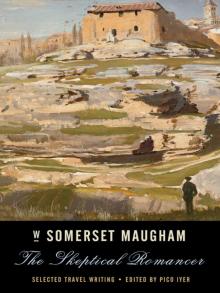 The Skeptical Romancer: Selected Travel Writing
The Skeptical Romancer: Selected Travel Writing The Summing Up
The Summing Up Up at the Villa
Up at the Villa The Razor's Edge
The Razor's Edge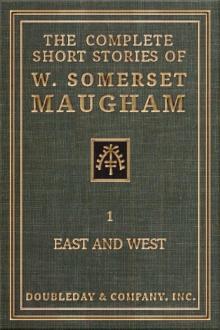 The Complete Short Stories of W. Somerset Maugham: East and West (Vol. 1 of 2))
The Complete Short Stories of W. Somerset Maugham: East and West (Vol. 1 of 2))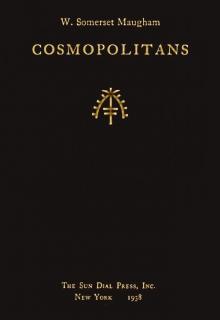 Cosmopolitans
Cosmopolitans 65 Short Stories
65 Short Stories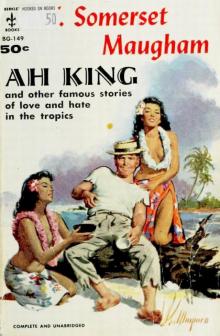 Ah King (Works of W. Somerset Maugham)
Ah King (Works of W. Somerset Maugham) Collected Short Stories: Volume 1
Collected Short Stories: Volume 1 Collected Short Stories Volume 2
Collected Short Stories Volume 2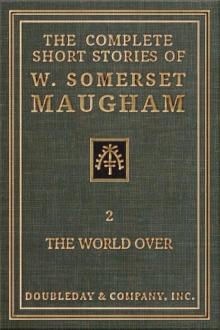 The Complete Short Stories of W. Somerset Maugham - II - The World Over
The Complete Short Stories of W. Somerset Maugham - II - The World Over Collected Short Stories Volume 4
Collected Short Stories Volume 4 Theatre
Theatre Short Stories
Short Stories Then and Now
Then and Now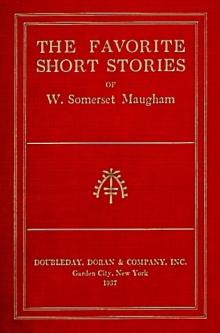 The Favorite Short Stories of W. Somerset Maugham
The Favorite Short Stories of W. Somerset Maugham Of Human Bondage
Of Human Bondage The Magician
The Magician The Great Exotic Novels and Short Stories of Somerset Maugham
The Great Exotic Novels and Short Stories of Somerset Maugham A Writer's Notebook
A Writer's Notebook Christmas Holiday
Christmas Holiday The Making of a Saint
The Making of a Saint Merry Go Round
Merry Go Round The Narrow Corner
The Narrow Corner Collected Short Stories Volume 3
Collected Short Stories Volume 3 Ten Novels and Their Authors
Ten Novels and Their Authors Ashenden
Ashenden The Moon and Sixpence
The Moon and Sixpence Cakes and Ale
Cakes and Ale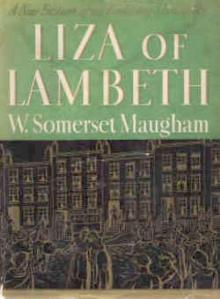 Liza of Lambeth
Liza of Lambeth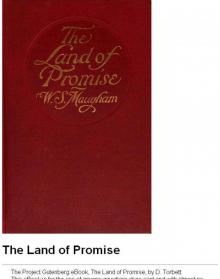 The Land of Promise: A Comedy in Four Acts (1922)
The Land of Promise: A Comedy in Four Acts (1922) A Writer's Notebook (Vintage International)
A Writer's Notebook (Vintage International)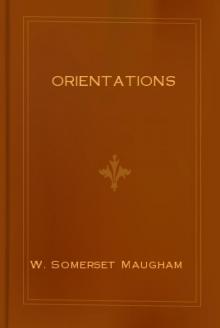 Orientations
Orientations Selected Masterpieces
Selected Masterpieces Mrs Craddock
Mrs Craddock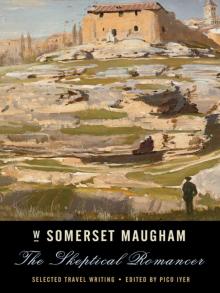 The Skeptical Romancer
The Skeptical Romancer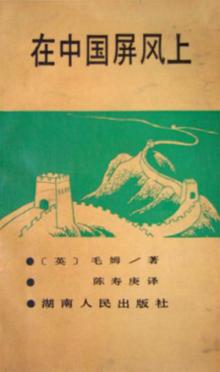 On a Chinese Screen
On a Chinese Screen (1941) Up at the Villa
(1941) Up at the Villa The Great Novels and Short Stories of Somerset Maugham
The Great Novels and Short Stories of Somerset Maugham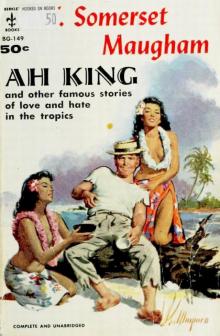 Ah King
Ah King The Explorer
The Explorer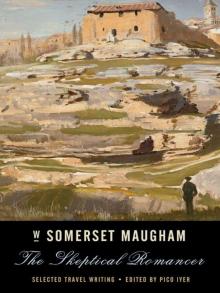 The Skeptical Romancer: Selected Travel Writing (Vintage Departures)
The Skeptical Romancer: Selected Travel Writing (Vintage Departures)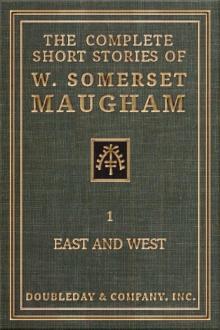 The Complete Short Stories of W. Somerset Maugham - I - East and West
The Complete Short Stories of W. Somerset Maugham - I - East and West